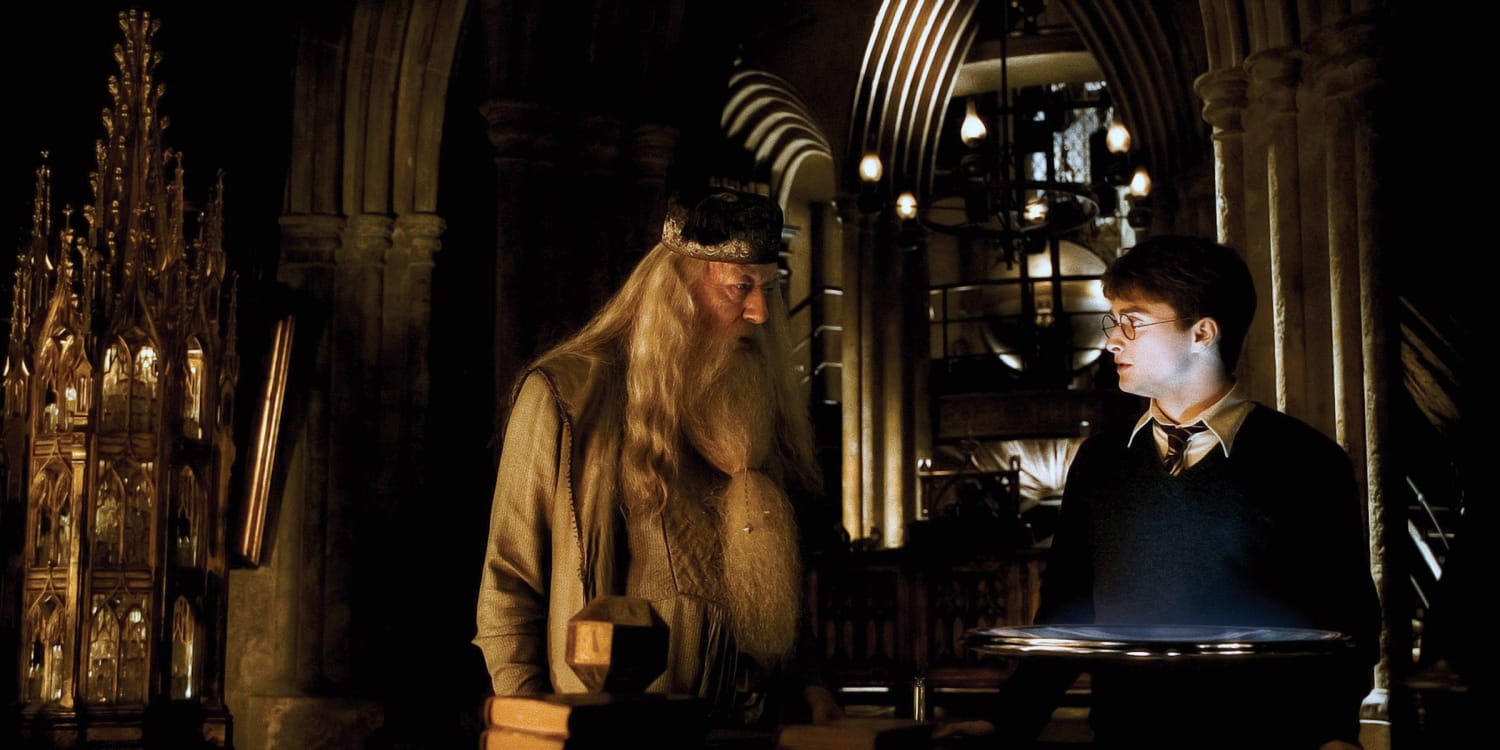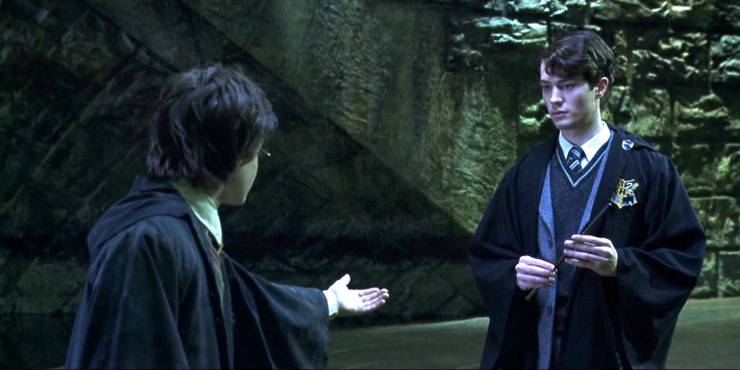Dumbledore vs Voldemort: Comparing Two Giants of the Wizarding World
Much has been said in the past of the similarities and differences between Harry and Voldemort, but few spend much time comparing and contrasting Voldemort and Dumbledore. This is in large part because the relationship between Harry and Voldemort is more complex and layered than any other in the series.
However, Voldemort and Dumbledore, as the heads of two warring factions for three books (since Dumbledore continues leading his side posthumously in many ways), deserve to have their characters and lives evaluated and pitted against each other as well. So let’s dive into how they are alike and how they are different.
“I wish I’d understood Dumbledore as well.” –Harry
Harry once says that he wishes he understands Dumbledore as well as he understands Voldemort. It’s a throwaway comment made toward the end of a very intense sequence of events, so it’s easy to overlook. But it’s actually rather staggering.
Harry and Dumbledore spend hours and hours of time together throughout the series, and during that time Dumbledore makes a very intentional effort to instill his beliefs and his worldview into Harry. By comparison, Harry only sees Voldemort sporadically, and while he does occasionally delve into his mind in a very immersive experience, he only really learns whatever Voldemort happens to be thinking about during those instances.
Dumbledore is a riddle wrapped in a mystery inside an enigma, as inscrutable as he is frustrating. Voldemort is a Riddle of a different kind (I’m sorry—it was right there), and he is far easier to comprehend. By the time Harry meets him, he is no longer interested in hiding what he is thinking or how he is feeling, things that Dumbledore guards jealously. That Harry learns more of Voldemort in fleeting encounters than he does of Dumbledore in the entirety of their mentorship is perhaps not surprising, but it is telling.

“Some were afraid, some just wanted a bit o’ his power.” –Hagrid
Both Dumbledore and Voldemort hold tremendous sway over very disparate groups of people, and they both have a tendency toward (or obsession with) controlling the circumstances and people around them. However, the way they gather and keep support is almost entirely opposite. Dumbledore’s network is more widespread (there is little evidence that Voldemort operates internationally beyond isolated incidents), and his leadership style is very relational. Rarely do we see him issuing orders or blatantly recruiting others to his causes. He invests in those he wishes to influence and persuades them to his way of thinking. It’s more subtle and takes more time, but his way of operating ensures loyal and eager followers. Consider how deeply Harry was committed to following his instructions to the letter after his death, even to the point of sacrificing himself.
On the other hand, Voldemort blatantly recruits others to his side, issues absolute and unquestioned orders, and controls his allies and the wider populace with fear and intimidation. He has little to no respect for those who pledge themselves to him, only seeming to hold Bellatrix and Nagini in any sort of regard. While his methods are in many ways effective and more efficient, they are also transient, gaining him only short-term and conditional support. Consider how quickly the vast majority of his followers denied and abandoned him after his first fall.
“The greatest wizard in the world is Albus Dumbledore.” –Harry
One major point that Tom Riddle fixates on is who is a greater wizard, Dumbledore or him. He’s actually quite touchy and insecure about the topic, while Dumbledore himself never seems to feel the need to draw the comparison in the first place. Harry, of course, takes Dumbledore’s side of the debate in Book 2 with little actual information to go on, but as the series progresses and we get to know both wizards better, we’re led to agree with him.
Some of Dumbledore’s edge over Voldemort might be due to the Elder Wand, but with everything we know of their respective histories and abilities, Dumbledore does appear to be the clear winner.

“Reckon Dumbledore’s the only one You-Know-Who was afraid of.” –Hagrid
As Victoria and I pointed out in our most recent episode, Dumbledore is not a warrior at heart; he’s a teacher and a leader. It’s easy to forget that, since for the majority of the time we spend with him, he’s putting those skills to use in the service of defeating Voldemort. But it’s important to remember that Dumbledore’s primary objective isn’t warfare—it’s stopping Voldemort. Warfare is merely the tool he uses to achieve that end.
Voldemort’s motives, on the other hand, are far more bloodthirsty. He wants to violently conquer the magical world and subjugate all magical and non-magical peoples under his banner. Warfare is the lifestyle he chooses to lead.
“If I remember correctly, you once saw the attraction of teaching too.” –Dumbledore, to Voldemort
It almost goes without saying that Dumbledore dedicates his life to nurturing young minds; indeed, it seems to be something of a calling for him. Voldemort pursues the career only briefly, and likely insincerely, but he also takes pains to teach his followers some of the tricks from his own playbook. He, the inventor of unsupported flight (presumably a very complicated endeavor, given that no one has managed it before), passes that knowledge on to Snape and possibly others of his followers. Why? There is very little practical application for the technique.
I think, deep down, Voldemort is a little bit of a teacher as well. He’d be terrible at it if he tried to make a profession of it, of course, and Dumbledore is absolutely right to deny him access to children. But, at the end of the day, I think Voldemort has a bit of a compulsion to pass his considerable knowledge on (except when it comes to Horcruxes—some things are sacred).
“Dumbledore has been a great wizard — oh yes, he has, the Dark Lord acknowledges it.” –Snape
Both Dumbledore and Voldemort… “respect” might not be the right word… understand that the other is formidable early on in their acquaintance. Dumbledore recognizes Tom Riddle’s talent and dark instincts immediately upon meeting him, and his first impression is reinforced time and again as he watches Riddle grow and then keeps tabs on his movements. On the other side, it’s universally agreed that Dumbledore is the only one that Voldemort has ever feared. His own followers openly recognize that Voldemort is wary of his old professor.

“He knew more than you, knew enough not to do what you’ve done. . . . He was cleverer than you, a better wizard, a better man.” –Harry
In Dumbledore’s own words, “It is our choices that show what we truly are, far more than our abilities.” At the end of the day, though Voldemort and Dumbledore do share some similar abilities and tendencies, they make different choices when they are young that set them on diametrically opposed paths. And they continue to make those choices and walk those paths for the rest of their lives.
Dumbledore could have been a Dark Lord, and he and Grindelwald could have ruled the world together as “benevolent overlords,” “for the greater good.” But Dumbledore comes to realize where that road would lead and what it would cost before he’s too far gone. He swerves.
Voldemort doesn’t. He enacts his grandiose plans and carries them to full fruition, uncaring of the damage and carnage left in this wake. In the end, though Dumbledore has many faults, Harry is right on who is the better, cleverer man.

